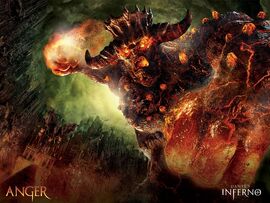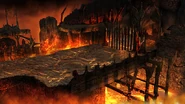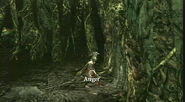
| |
| Anger | |
| Circle Number | 5 |
|---|---|
| Boss | Phlegyas |
| Creatures | All from Previous Circles |
| Locations | The River Styx City of Dis |
| Host | Filippo Argenti |
| Prev. Circle | Greed |
| Next Circle | Heresy |
“See the souls over whom anger prevailed. In the warm bath of the sun they were hateful, down here in the black sludge of the river Styx do they wish they had never been born.” — Virgil
Anger was the fifth Circle of Hell.
Overview
Dante continued to search for Beatrice in the fifth circle and confronted the boatman, Phlegyas, a giant, flaming demon whom Dante unknowingly rode across the River Styx, a toxic marsh which eternally drowned those overcame with rage while alive. Those who expressed anger (the wrathful) attacked each other on the swamp's surface while those who repressed anger (the sullen) eternally drowned beneath the marsh. Escaping the behemoth's fury, he rode atop Phlegyas into the City of Dis, guarded by the powerful Fallen Angels to the lower circles.
Areas of the Circle
- Phlegyas: "Behold the Power of Phlegyas, Guardian of the River Styx. Only he may grant passage across the swamp, to the city of darkness and the circles below."
- The River Styx: "The Styx, a toxic marsh. Those awash with anger drowned again and again, choking on their own venom."
- The City of Dis: "The City of Dis held Hell's deepest secrets and the worst violent and treacherous sinners. The fallen angels guarded it's walls and flaunted his kingdom."
Trivia
- In "Inferno", Dante encounters Filippo Argenti. When it comes to the City of Dis, Dante encounters the Fallen Angels, the Furies, and Medusa. Virgil also mentioned to Dante on how the witch Erichtho sent him down to the lowest circle of Hell to bring back a spirit from there.
- In mythology, the river Styx ("Hateful") was not a swamp but a river of the Underworld, inhabited by nymphs. The river was named after one such nymph, Styx, who save Zeus's life during the Titanomachy. In gratitude to her Zeus decreed the river Styx sacred, and any who made a vow on that river was to keep that vow at all cost. Breaking a vow made on the river Styx would result in death for mortal beings and prolonged incapacitation for a god. Furthermore, as shown in the myth of Achilles a human who was bathed in the waters of the Styx became physically impermeable to weapons.
- Anger is derived from the Latin word Ira and is defined as uncontrollable rage to the point of wishing or actually inflicting harm to others. It is categorized as a Deadly Sin due to the fact that if unchecked, Anger can lead to the physical and emotional injury or death of others, and possibly the sinner as well. In addition, in a rage people often cannot distinguish friend from foe and may strike out at anyone within their reach.
- In the Divine Comedy, sunken beneath the Stygian waters were not the Sullen, but the Slothful. This was the only circle designated to two of the Seven Deadly Sins rather than one.
- According to Dante Anger was a righteous desire for Justice perverted into an obsessive rage for immediate, extreme action against both the innocent and the guilty. Since it is not a sin derived from Divine Love, such as Lust, Gluttony and Greed, it is placed below these sins.
- Unlike the Sullen, Slothfulness is not related to repressed anger. The Deadly Sin of Sloth (Acedia in Latin) is a lack of care or indifference towards others and the world, to the point of seeing only negativity in the world. This is considered a Deadly Sin as the sinner fails to see or care about the goodness God has placed in the world around them. As such, in Hell they are sunken under the marsh water because they cannot see the point of trying to rise above the surface and save themselves from drowning.
- Slothfulness, in Dante's view, is in direct opposition to the sins derived from Divine Love. His works consider Sloth to be derived from a lack of Divine Love for the world God made, which places it below the sins of Lust, Gluttony and Greed. It also functions as a boundary point between the circles of Hell associated with corrupted love and the remaining circles dealing with deliberate, loveless malice.
- This is the final circle of Hell to be associated with the Seven Deadly Sins.
Gallery
| Nine Circles of Hell |
|---|
| Limbo · Lust · Gluttony · Greed · Anger · Heresy · Violence · Fraud · Treachery |



